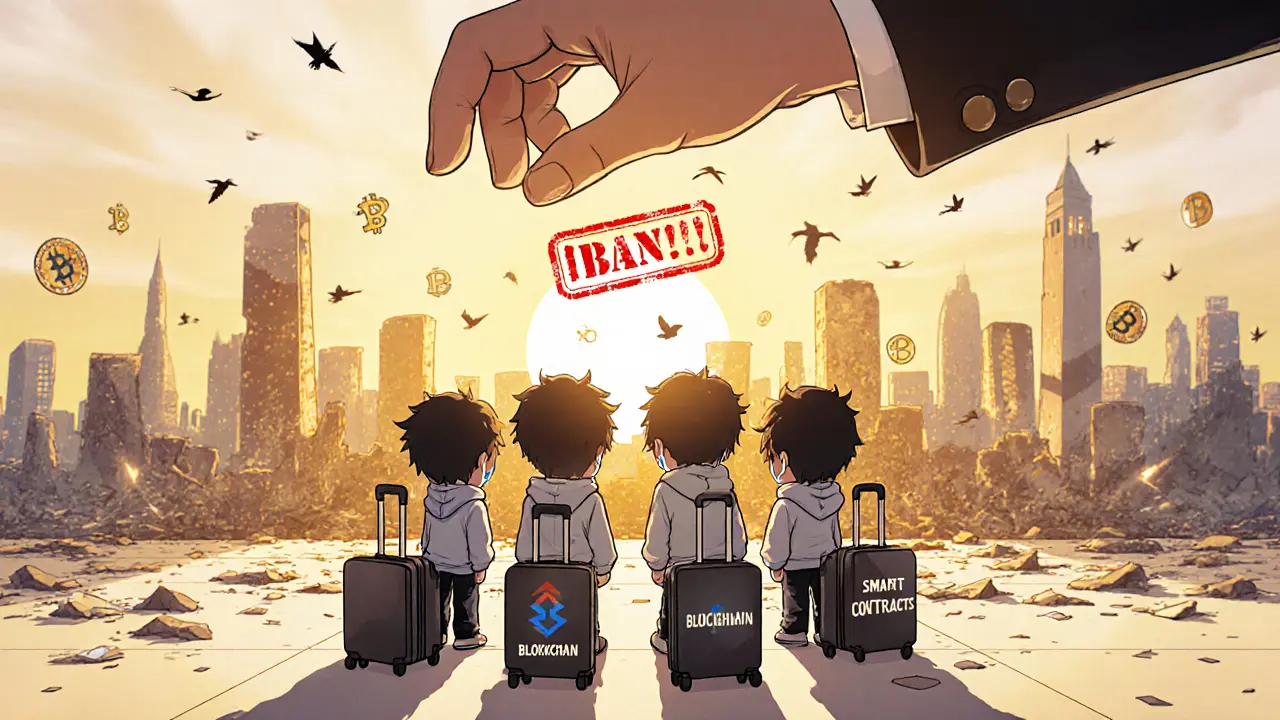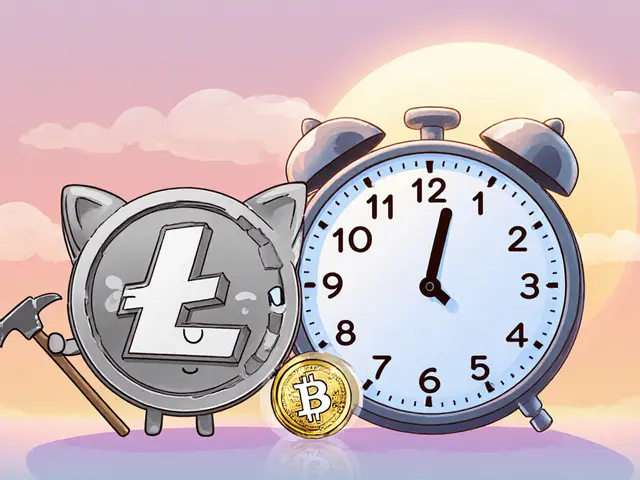Algeria Crypto Penalty Calculator
WARNING: Under Algeria's Law No. 25-10 (July 2025), cryptocurrency activities are illegal with severe penalties. This calculator demonstrates potential consequences only for educational purposes.
Calculate Your Potential Penalty
Algeria's Crypto Ban Facts
First offense: 2 months - 1 year in prison + 200,000 - 1,000,000 DZD ($1,500 - $7,700)
Repeat offense: Up to 2 million DZD ($14,700) + potential combined penalties
Legal scope: All crypto activities including holding, trading, promoting, and education
Penalty note: The total penalty may include both jail time and fines simultaneously
Potential Penalty Results
Enter your information to see potential penalties.
As of July 2025, Algerians cannot legally access cryptocurrency exchanges-not because of technical barriers, but because the government made it a crime. Law No. 25-10, published on July 24, 2025, outlawed every single activity related to digital assets: buying, selling, holding, mining, promoting, or even discussing crypto as an investment. This isn’t a gray area. It’s a total ban. And it’s being enforced with real jail time and heavy fines.
What the Law Actually Bans
Algeria’s new law doesn’t just block access to Binance or Coinbase. It criminalizes the very idea of owning Bitcoin or Ethereum. The law defines cryptocurrencies as ‘virtual instruments used as means of exchange via a computer system, without support from a central bank.’ That’s it. No exceptions. No loopholes. Not even holding crypto in a wallet is allowed. The government doesn’t care if you bought it before the ban. If you still have it, you’re breaking the law.
The penalties are severe. First-time offenders face between two months and one year in prison. Fines range from 200,000 to 1,000,000 Algerian dinars-roughly $1,500 to $7,700. For repeat offenses or cases tied to organized crime, fines can jump to 2 million dinars ($14,700). And yes, you can get both jail and a fine at the same time.
Even helping someone else trade crypto is illegal. Running a local peer-to-peer group? Illegal. Creating a YouTube video explaining how Bitcoin works? Illegal. Offering to store someone’s crypto in a digital wallet? Also illegal. The law casts a wide net, targeting not just users but anyone who enables access.
How Algeria Got Here
Just a year before the ban, Algeria was one of the fastest-growing crypto markets in North Africa. Chainalysis ranked it in the top five in the MENA region for peer-to-peer trading volume. People were using crypto to send money across borders, invest in DeFi protocols, or protect savings from inflation. The government didn’t act on it-until it did.
The shift came with a sudden, sweeping crackdown. Officials cited financial stability, money laundering risks, and guidance from the Financial Action Task Force (FATF) as reasons. But the timing is telling. Algeria’s central bank has long controlled the flow of foreign currency. Crypto threatened that control. With over 30% of Algerians under 25 and rising unemployment, digital finance offered an escape route. The state chose to shut it down instead.

What People Are Doing Now
Despite the ban, demand hasn’t disappeared. It’s gone underground.
Some Algerians use VPNs to access foreign exchanges like Binance or Kraken. They create accounts with fake IDs, fund them through unofficial channels, and trade in secret. Others rely on encrypted messaging apps like Telegram or Signal to find peer-to-peer traders. A buyer might pay in cash through a middleman, then receive crypto via a non-custodial wallet. It’s risky, slow, and messy-but it works.
Decentralized exchanges (DEXs) like Uniswap or PancakeSwap are also being used. Since they don’t require KYC, they’re harder to track. But even here, the risk is real. Algerian authorities have upgraded their digital surveillance tools. They monitor IP addresses, detect unusual data flows, and collaborate with international agencies to trace crypto transactions linked to Algerian accounts.
There’s no safe way to do this. Every step carries legal risk. A single transaction could lead to a raid, an arrest, or a frozen bank account. And because the law criminalizes *any* exposure to crypto-even educational content-many people who once taught others how to use it now stay silent.
The Brain Drain
Before the ban, Algeria had a growing community of blockchain developers, smart contract engineers, and crypto analysts. Universities offered courses on decentralized systems. Startups were building local fintech tools. Now, that talent is fleeing.
Many developers have moved to Morocco, Tunisia, or the UAE, where crypto is legal or at least tolerated. Others have switched careers entirely. The country is losing its next generation of tech innovators-not because they lack skill, but because the law made their work a crime.
There’s no official data on how many left, but local tech forums are full of posts like: ‘I’m leaving. No future here.’ The government didn’t just ban crypto. It banned the future of digital innovation in Algeria.

How This Compares to the Rest of the World
Algeria is one of only nine countries in the world with a complete crypto ban. Others include Egypt, Nigeria (temporarily), and China. Most other nations-even those wary of crypto-are moving toward regulation, not prohibition.
The European Union has MiCA, a comprehensive framework that licenses exchanges and protects users. The U.S. has multiple agencies overseeing crypto, with clear rules for taxation and reporting. Even countries like India and Brazil, which once cracked down, now allow regulated trading.
Algeria’s approach is the opposite. Instead of creating guardrails, it built a wall. The result? Algerians are cut off from global finance. They can’t use crypto to send remittances, invest in global startups, or access DeFi yields. They’re stuck with a weak local currency and limited financial tools.
What This Means for the Future
There’s no sign the ban will be lifted. The government has doubled down on surveillance. Banks are required to report any suspicious activity linked to digital assets. Schools and universities have been ordered to remove crypto-related content from curriculums.
But the world keeps moving. Cryptocurrencies are becoming part of everyday finance-from payroll systems to cross-border payments. By banning them outright, Algeria is choosing isolation over innovation. The short-term goal may be control. The long-term cost? A generation left behind in the digital economy.
For now, the only way Algerians access crypto is through risk. And that risk isn’t just financial. It’s personal. It’s legal. It’s life-changing.
Is it illegal to own Bitcoin in Algeria?
Yes. Under Law No. 25-10, enacted in July 2025, owning, holding, or storing any cryptocurrency-including Bitcoin, Ethereum, or Tether-is strictly prohibited. Even if you bought it before the ban, keeping it now is a criminal offense punishable by jail and fines.
Can I use a VPN to access Binance or Coinbase from Algeria?
Technically, yes-but it’s illegal. Using a VPN to bypass government restrictions and access foreign exchanges violates Algeria’s crypto ban. Law enforcement monitors digital traffic and has tools to detect suspicious activity. Getting caught could lead to imprisonment or heavy fines, even if you’re just trading small amounts.
What happens if I’m caught trading crypto in Algeria?
You could face two months to one year in prison and a fine between 200,000 and 1,000,000 Algerian dinars (about $1,500-$7,700). For repeat offenses or if linked to organized crime, fines can reach 2 million dinars ($14,700). Both jail and fines can be applied together. Authorities are actively tracking crypto-related activity through digital surveillance.
Can I legally educate others about cryptocurrency in Algeria?
No. The law prohibits any form of promotion, advertising, or educational activity related to cryptocurrencies. Giving a lecture, posting a video, or even writing a blog about how crypto works could be considered a violation. Authorities treat this as part of the broader crackdown on crypto influence.
Are there any legal alternatives to crypto in Algeria?
The only legal financial tools are those regulated by the Algerian central bank: local bank accounts, wire transfers, and government-issued bonds. Remittances must go through approved channels. There are no legal alternatives for accessing global digital finance, investing in tokenized assets, or earning yield through decentralized systems. The system is intentionally closed.
Is Algeria the only country with a crypto ban?
No, but it’s one of the strictest. As of 2025, only nine countries have complete bans on cryptocurrency. Others include Egypt, Nigeria (temporarily), and China. Most countries are moving toward regulation, not prohibition. Algeria’s approach is among the most aggressive, targeting not just trading but also education and wallet storage.







Arthur Crone
November 13, 2025 AT 18:37This is why Algeria’s economy is a dumpster fire. They’d rather jail people than adapt. Crypto isn’t the problem - their central bank’s incompetence is.
Rebecca Saffle
November 15, 2025 AT 06:47So let me get this straight - the government bans Bitcoin because it’s a threat to their control… but they’re fine with a currency that’s been losing value for a decade? Classic authoritarian logic.
Brian Gillespie
November 17, 2025 AT 00:47People are risking jail just to send money home. That’s not a crypto problem. That’s a poverty problem.
Wayne Dave Arceo
November 18, 2025 AT 16:10The law is clear: no crypto. No exceptions. No excuses. If you’re using a VPN to bypass sovereign monetary policy, you’re not a tech-savvy innovator - you’re a lawbreaker. Period.
Ashley Mona
November 19, 2025 AT 22:41Algerians are using DEXs like Uniswap like it’s a survival hack. And honestly? That’s kind of beautiful. Human ingenuity doesn’t care about borders or bans.
Michelle Elizabeth
November 21, 2025 AT 11:15It’s not about crypto. It’s about control. The state doesn’t want people thinking for themselves. Bitcoin = freedom. Freedom = threat. Simple math.
Rachel Everson
November 22, 2025 AT 20:05If you’re an Algerian reading this - you’re not alone. People around the world are watching. Your courage matters. Stay safe.
Michael Heitzer
November 23, 2025 AT 12:47History always remembers the people who refused to be silenced. Algeria’s youth aren’t just trading crypto - they’re building a new economic identity, one encrypted transaction at a time. This isn’t rebellion. It’s evolution.
Johanna Lesmayoux lamare
November 24, 2025 AT 13:05They banned education too? That’s the real crime.
dhirendra pratap singh
November 25, 2025 AT 02:51OMG imagine getting arrested for owning ETH?? 😭 This is why I left Nigeria. At least they let you trade if you pay the bribe. Algeria? No mercy. No mercy at all.
Arthur Coddington
November 26, 2025 AT 06:16It’s not about finance. It’s about fear. The state fears that if people learn to transact outside their system, they’ll stop fearing the system altogether. That’s why they’re so brutal.
Elizabeth Stavitzke
November 28, 2025 AT 05:45Oh look, another ‘poor oppressed crypto user’ sob story. Newsflash: if your country bans something, maybe don’t do it. You’re not a martyr. You’re just dumb. And now you’re dragging down your entire nation’s reputation.
ty ty
November 28, 2025 AT 06:16So you’re telling me you’d rather risk prison than use a bank? That’s not bravery. That’s stupidity. Get a job. Save in dollars. Stop being a crypto bro.
Ainsley Ross
November 29, 2025 AT 00:00As someone who has studied financial sovereignty across the Global South, Algeria’s move is a tragic misstep. Financial inclusion is not about control - it’s about dignity. By criminalizing access to global finance, they are criminalizing hope.
BRYAN CHAGUA
November 30, 2025 AT 06:30There’s a quiet revolution happening in Algerian living rooms. People are learning Solidity on Telegram. Kids are coding smart contracts on borrowed laptops. This isn’t just defiance - it’s the birth of a new digital culture. And it’s beautiful.
Stephanie Platis
December 2, 2025 AT 02:11Law No. 25-10 is unambiguous, enforceable, and constitutionally sound. The government has a duty to protect its citizens from speculative, unregulated, and inherently unstable digital assets. Those who violate it are not heroes - they are reckless.
Joanne Lee
December 2, 2025 AT 20:38It’s fascinating how the same institutions that warn against money laundering now criminalize financial innovation. Is it the technology they fear - or the loss of centralized power?
Joy Whitenburg
December 3, 2025 AT 22:22my cousin in algiers just told me she’s using a friend’s uncle’s cousin’s phone to do p2p trades… and she’s 16. like… what even is this world anymore?? 😅
tom west
December 5, 2025 AT 18:48Let’s not romanticize this. The vast majority of Algerian crypto users are not tech pioneers - they’re speculators chasing quick gains, using crypto as a casino disguised as innovation. The ban is a public service.
Kristin LeGard
December 6, 2025 AT 08:20They banned crypto? Cool. Now they’ll ban Wi-Fi next. At this point, I’m surprised they haven’t outlawed calculators.
Phil Bradley
December 8, 2025 AT 04:57Think about it - if you had to choose between your freedom and your savings… which would you risk? This isn’t about money. It’s about who gets to decide what’s possible.
Edward Phuakwatana
December 8, 2025 AT 17:26Algeria’s ban is a textbook case of regulatory failure. Instead of building a regulatory sandbox, they built a prison. The result? A black market for financial sovereignty. The real losers? The next generation of engineers who could’ve built the next DeFi giant - now forced to leave or shut down.
Adrian Bailey
December 9, 2025 AT 01:59so i read this whole thing and honestly? i’m just sad. like, imagine growing up with no access to global finance, no way to invest, no way to send money to family abroad without paying 20% in fees. it’s not about bitcoin, it’s about being locked out of the future. and now they’re punishing teachers for teaching it?? that’s just… messed up. 🤕
Debraj Dutta
December 9, 2025 AT 02:15India once banned crypto too. Then we regulated it. Now it’s thriving. Algeria’s choice is not inevitable. It’s a policy decision - and policy can change.
Suhail Kashmiri
December 9, 2025 AT 10:34bro what’s next? banning google? you think this is gonna stop the youth? nah. they’ll just use TOR and laugh at you while you’re still stuck in 1998.